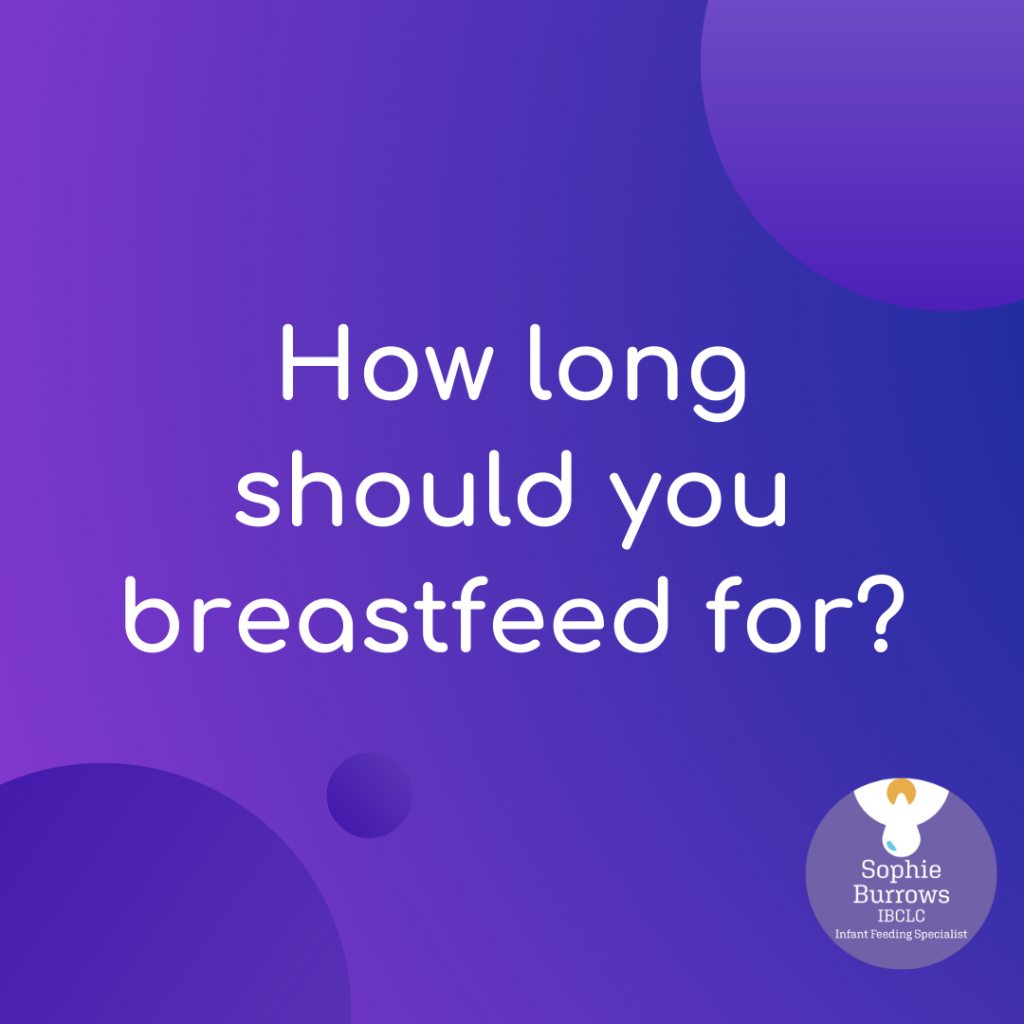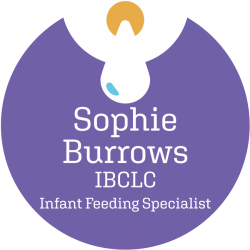
Audio can be accessed here: https://anchor.fm/sophie-burrowsIBCLC/episodes/How-long-should-you-breastfeed-for-eb0che
A question with (insert tense music) no answer (is that gasps I hear?)
It really doesn’t have an exact answer.
Breastfeeding in a biological sense, if perhaps we were Sir David Attenborough (begin reading in his voice) would be something like this: Here we have a female and her infant. The infant has just been born, the birth was quiet and uninterrupted and the infant begins its journey to its life source for the next 6 months, the breast. The infant uses its reflexes to move its body towards the nipple licking, feeling, smelling its mother. Bobbing its head side to side, up and down and then latches on and begins suckling. It stays for a while before peacefully falling asleep as the mother begins to recover and has birthed her placenta. The infant then can breastfeed for anywhere up to mid/ late childhood taking on additional nutrients in solid food form from around the middle of the first year of their life. The breast becomes a place of secure attachment for the infant.
(ok back to your own inner voice now, if you can!)
That’s kind of the “ideal” situation. Modern day interferes with this, at times quite frustratingly. Birth can often now be a loud and interrupted process, often not one that was envisaged. Medications and interventions in birth can put up some massive barriers for both mother and baby. Both parties can be in a level of shock from birth, be it fast or slow. This can make it hard for a baby to find and latch on to the breast. This can affect how long breastfeeding occurs for. It can sometimes mean a baby never makes it to the breast. A baby being uncomfortable or perhaps tight in certain areas of their body because of birth and being in the womb can make it hard for them to latch on to the breast effectively or in some cases at all. Skilled support on these occasions is essential for those who want to breastfeed.
Then we have culture. In the UK our culture isn’t really a supportive one at all when it comes to breastfeeding (our breastfeeding rates make that abundantly clear). How long we think we should breastfeed for is based on our culture and what we’ve heard and seen, often in the media. Our family also has a big bearing on what we decide to do, things like how you were fed as an infant can have a significant impact on how long you breastfeed for and the type of support you in turn receive for your feeding journey.
There is a lovely article which you can access here called “Breastfeeding in Mongolia” it’s a great way of learning that one culture isn’t the same as everyone else in the world. There are many ranges of “normal” and what we value in this country will unlikely be of the same value in another country and vice versa but, by hopefully learning about different cultures and how infant feeding works for them we can work out perhaps what we truly want to do when it comes to feeding our infants. You won’t be alone in perhaps wanting to feed your baby until they outgrow the need, there are pockets of similar minded people in the community and they probably can’t wait to meet you. There are some excellent Facebook support groups one particular one is called “Breastfeeding older babies and beyond” a really great group where you can hopefully in some way begin desensitise your reaction to an older child feeding and realise how powerful and useful it can be as part of a parent child relationship. I would have, long ago, taken a double look at a toddler or older child at the breast, now it fills me with such a wonderful feeling to see with a deep understanding to how hard that pair might have had to worked to let that moment even occur. How useful it can become as a tool and the comfort it gives a child.
All that being said, sometimes breastfeeding stops well beyond where we thought it might. There are some books published on the trauma and grief of this process. Professor Amy Brown has studied and written about this in depth. One of her books “Why breastfeeding grief and trauma matter” helps to unpick what’s really going on with this and why it matters so much. It is traumatic to experience the end of breastfeeding, especially when it doesn’t feel like we had any control over the process. It’s a process involving hormones as well as everything else and female hormones are probably the most deserving of respect for their true level of power and influence they can have over the human body.
I feel it’s important to add here where the idea of breastfeeding for six months only comes from. It comes from the World Health Organisation and their wording surrounding recommendations. Here’s the wording:
“WHO recommends mothers worldwide to exclusively breastfeed infants for the child’s first six months to achieve optimal growth, development and health. Thereafter, they should be given nutritious complementary foods and continue breastfeeding up to the age of two years or beyond.”
Source: click here
What you can see above is that there are two sentences and most people stop listening after the first one and they defiantly don’t read “or beyond”. We have a deep lack of understanding what breastfeeding looks like after early infancy too as a society. We end up with silly comments like “but they should be eating solid food now” in judgment to not understanding that breastfeeding changes to something that happens alongside a nutritious diet of solid food within the first year of life.
We also have the comments like “once they can ask for it, they shouldn’t have it” well, sorry to break it to you but they asked from the moment they were born in their own way so not sure how you make such a distinction nor remove something so often important to a child so abruptly because they have put a sentence together. Another classic reason used to suggest halting breastfeeding is teeth… teeth truly don’t make your child into a crocodile. If you are mistakenly bitten there’s support for that here. They will settle down in to feeding nicely again after some gentle adjustments from you and around this time they begin to learn that your feelings matter too when it comes to breastfeeding and you begin your journey of genital guidance when things are not going quite how you’d like as a parent.
So, the answer to the question; Ideally when the child outgrows the need, but this depends on countless factors and breastfeeding is a relationship, it has got to work for both parties and both parties’ matter in that decision.
Blog disclaimer
I use the word mother (and other types of word like this) within my work. This truly doesn’t mean I exclusively see those who birth as mothers/ female only. I am accepting and welcome the use of all other terminology and try to give a neutral tone throughout my work. I acknowledge I have much to learn in this area but I am accepting of any identity of human including those who wish to give human milk to their human baby. Chest feeding is a term I fully accept a respect. My mission in life and therefore my work is to help others feed their babies human milk hopefully, from their birth parent and sometimes from another human milk donor, to allow that parent meet their goals. Nourishing a human infant can take many forms, I will support all of those forms to the best of my ability my blogs and work are written with this in mind but I accept I use mother etc often and I am sorry if this in any way causes dysphoria.
I have dyslexia and writing in itself is quite an exceptional effort for me punctuation is even harder. It can take me twice as long than others without my disability, to write a working sentence especially if I cannot spell a word and have to change a sentence entirely for it to “work”. This means deviating from wording and at times it can be mindboggling for me. I welcome your discussion with me and thank you for your understanding.
